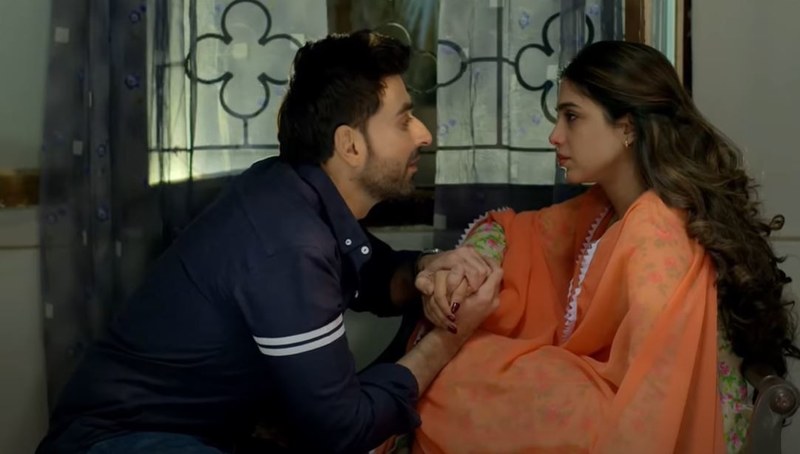Saraab continues to educate the audience with its interesting and insightful screeplay!
OMAIR ALAVI UPDATED 06 NOV, 2020 01:41PM
The last two episodes (eleventh and twelfth) of Saraab may have taken place mostly indoors but they have kept the audience involved because of the fast-paced narrative and intelligent screenplay. With Sonya Hussyn’s character becoming cautious of everyone, and Sami Khan’s Asfand Yar taking the blame to protect her, things are moving in the right direction. It remains to be seen whether they end up together or not, whichever route the story takes, it would be interesting because the writer and director know their craft, and the actors are all set in their characters.

The Plot
After Hoorain (Sonya Hussyn) opens the door to the room in which she has locked herself to Asfand Yar (Sami Khan), she shocks him by disclosing that she knows he violated her, when in fact nothing of that sort happened. Asfand Yar’s mother (Kinza Malik) is angry at her son but his father (Sajid Shah) understands what he is doing, and why he is doing it. His only concern is that by marrying Asfand Yar to Hoorain, his son’s life would revolve around his wife’s illness than anything else. That’s why he takes Hoorain back to her house, tells her father (Aurangzeb Leghari) that he wants to make her his daughter in law, and returns, only to be confronted by Asfand Yar who never wanted them to take her back. Back home, she tells her father that she is pregnant when she isn’t, prompting him to nearly choke her to death; when she survives, her father decides to get her married to Asfand Yar. He asks his parents to visit him, but Namal (Nazish Jahangir) calls up Warda (Ghana Ali) who is against this possible union and promises to make an entrance to stop the marriage.

The Good
The last two episodes have Sami Khan and Sonya Hussyn on fire, both individually and as a couple. They know exactly how to act and react when together and even though Sami Khan’s character knows that Sonya Hussyn’s Hoorain is unstable because of her illness, he takes all the blame in a selfless act. The scene where he convinces her to take medicine shows that romance can be portrayed without going over or vulgar. Although he was there for just one scene in the last episode, it was enough for his fans (and those of the couple) to be content with their combustible chemistry.

And if you want to know from where Asfand Yar inherits his compassion, look no further than his onscreen father Sadaqat sahib (Sajid Shah) who stays cool and calm even in rough and tough situations. The scene where he confronts his son and then asks him about his own niece’s condition shows how good an actor he really is. Then there are the two ‘evil’ sisters played by Ghana Ali and Nazish Jehangir who are caring one moment (mostly Nazish), and evil the rest but that has more to do with Hoorain’s antics than their sibling rivalry. It was good to finally understand why Hoorain felt a fish out of the water (her parents wanted a boy, instead of her) but shouldn’t that have been highlighted long before the twelfth episode, that’s the question. One must mention veteran actor Aurangzeb Leghari’s performance in that discussed flashback, and it makes one realize that the legendary actors of the glorious past are still a force to reckon with.

The Bad
With the drama moving at a good pace, it is about time that the audience is educated regarding Schizophrenia. Most of the people have no clue about it, and the young are still unable to digest that there are not two but just one Asfand Yar. A session with a doctor where some of the characters are asking questions would help the play achieve its main objective. The actress playing Hoorain’s mother Farida Shabbir shouldn’t be a part of any such discussion because even in mute mode, her voice pierces through the TV and enters the real world. Also, some of the dialogues she spoke in the first scene of the latest episode seemed repetitive as if the editor conveniently missed the scene, for some reason. There was also another scene in which Ghana Ali’s character and that of her mother were trying to act suspicious in front of her husband (Mohsin Ejaz); why that was so obvious for everyone to notice is still something hard to digest.

The Verdict – Low on ratings, high on content, Saraab is here to stay!
Saraab may not be getting the kind of ratings expected from it, but the high-quality script and direction makes it one of the few dramas from 2020 that are here to stay. People will give reference to this play in the future when Schizophrenia will be discussed, so close it is to reality. It shows the mindset of those people who know about the condition and those who don’t, highlighting the two faces of society. Writer Edison Idrees Masih and director Mohsin Talat must be commended for sticking to a subject that is considered taboo in our media. Kudos to the actors who took up the challenge and gave their best despite knowing that the play might not break records, but it will help in educating the audience.







